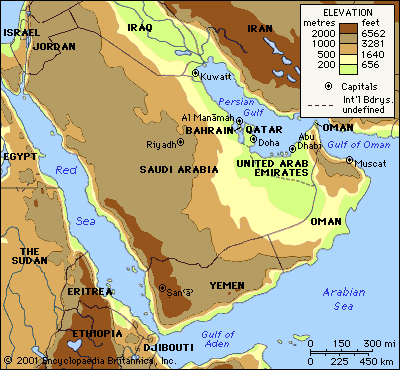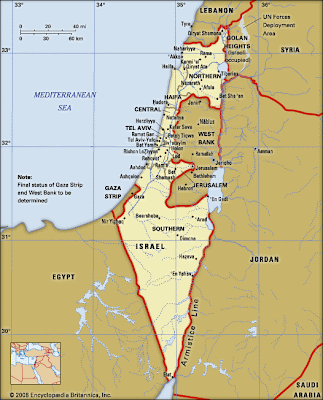Beyond Palestinian-Israeli impasse to a diplomacy rooted in international
law, human rights, equality for all
Two articles excerpted, edited with re-reporting by Carolyn
Bennett
 |
| Ancient Middle East Britannica image |
What is essential after 20 years of failed U.S. diplomacy, says
Institute for Policy Studies Fellow Phyllis Bennis, is “some means of moving
the debate out of Washington and into the United Nations.”
“The challenge to and overthrow of U.S.-backed dictators across the
Arab world is changing landscapes across the region and in countries far from
the Middle East,” Bennis wrote in an article published on Wednesday, before President
Mahmoud Abbas made the case for full Palestinian membership at the United
Nations. “The notion spreading throughout the ‘Arab Spring’ — that a
revolutionary process could contain both an internal focus (the shaking up of old social
hierarchies) and an external focus (aimed at shaking out old leaders and
old ideas) — had its roots in the first Palestinian uprising, the
socially inclusive, grassroots-based and non-violent intifada that began a
generation ago in 1987. So it should surprise no one that Palestinians are
still engaged in nonviolent mobilization that aims both to end Israeli
occupation, settlement, and apartheid, and to democratize and hold accountable
its own internal leadership.
 |
| Arabia Britannica image |
… For the first
time since before World War II, the United States cannot rely on sycophantic
Arab dictators willing to viciously suppress their own people in order to sign
friendly oil contracts and make nice to Israel, while maintaining the good ties
to Washington that keep the stream of arms sales and foreign aid flowing.
For the first
time, some Arab regimes are being forced to at least partly take into account
popular opinion.
… [I]n such a
heated and high-profile atmosphere, a U.S. veto [of Palestinian full membership
in the UN] will almost certainly lead to significant diplomatic challenges for
Washington’s military, resource, economic and political relations.
After the Palestinian president’s
Friday speech before the UN General Assembly, Bennis wrote this.
“There was a potential game changer
in Palestinian leader Mahmoud Abbas’s speech … that marks the end of the 20-year-long U.S.-backed
failed peace process and the potential beginning of a whole new approach to
Palestinian-Israeli diplomacy — one based on international law, human rights
and equality for all.
No longer is the
failed U.S.-controlled ‘peace process’ the only diplomatic game in town.
The Palestinian
application for recognition as a full Member State of the United Nations places
the diplomacy squarely where it has always belonged — in the UN, not
in Washington. …
 |
| Middle East incl Occupied Territories Britannica image |
“T]here is now at least the basis
for laying a new diplomatic foundation, different from the current approach
that maintains Israel’s huge disparity in power and accepts Israeli ‘red lines.’
… This could mean something entirely new
— diplomacy grounded in international law and human rights that ends
occupation, ensures the right of refugees to return to their homes, and
replaces apartheid with equality for all.…
“… [T]he challenge is to make
this new opportunity real and to take maximum advantage of it, not to let it
dissolve into endless bureaucracy. There is a serious danger that the UN
Security Council, rather than moving to schedule a rapid vote with its
inevitable U.S. veto, will instead move to create a committee, to launch an
investigation, to commission a report… and otherwise move to simply bury the
Palestinian application in the labyrinthine mumbo-jumbo of UN diplo-speak. …”
But maybe, she says —
“… Maybe some governments will take seriously their obligation to
protect an occupied population suffering under decades of occupation, apartheid
and dispossession.
“Just maybe this will mark the beginning of a different approach to
achieving Palestinian rights and equality — with the world, not the United
States, as the ‘honest broker.’
“… Twenty years of a U.S.-controlled process designed to maintain
Israeli power and privilege is over. ‘It
is enough.’”
Sources and notes
“Bye-Bye ‘Peace Process -- Palestine Comes to the UN” (Phyllis Bennis),
September 21, 2011, http://www.ips-dc.org/articles/bye-bye_peace_process_palestine_comes_to_the_un
“Abbas at the United Nations a
Game Changer? Maybe” (Phyllis Bennis), September 23, 2011, http://www.ips-dc.org/articles/abbas_at_the_united_nations_a_game_changer_mayb
Also listen on CounterSpin: “Phyllis Bennis on Palestinian statehood — Mainstream
reporting on the Palestinian bid for UN recognition regularly employs loaded
language in portraying the initiative as an underhanded gambit which is
threatening to the U.S. and Israel. Exactly how does the Palestinian bid
threaten anyone?
“Has the U.S. press always
disdained unilateralism in Middle East? … CounterSpin talks with Phyllis
Bennis, director of the New Internationalism Project at the Institute for
Policy Studies.
CounterSpin (9/23/11-9/29/11), http://www.fair.org/index.php?page=4404
PHYLLIS BENNIS
Veteran writer, analyst and activist on Middle East and UN issues, Phyllis
Bennis is a fellow at the Washington-based Institute for Policy Studies and
director of its New Internationalism Project. She is also a fellow of the
Transnational Institute in Amsterdam. In 2001, Bennis helped found and remains
on the steering committee of the U.S. Campaign to End Israeli Occupation.
She works closely with the United
for Peace and Justice anti-war coalition and co-chairs the UN-based
International Coordinating Network on Palestine. Since 2002, she has played an
active role in the growing global peace movement. She continues to advise several
top UN officials on Middle East and UN democratization issues.
Books by Bennis include Understanding the Palestinian-Israeli
Conflict: A Primer and Calling the
Shots: How Washington Dominates Today’s UN. http://www.ips-dc.org/staff/phyllis
MAHMOUD ABBAS
A Palestinian politician, who served briefly as prime minister of the Palestinian
Authority in 2003, Mahmoud Abbas was elected PLO president in 2005 after the
death of PLO president Yāsir Arafāt.
In the early 1990s, Mahmoud Abbas shaped Palestinian negotiating
strategy at both the peace conference in Madrid (1991) and in secret meetings
with the Israelis in Norway. Through the resulting Oslo Accords (1993), Israel
and the Palestinians extended mutual recognition to each other, and Israel
ceded some governing functions in the West Bank and Gaza Strip to a Palestinian
Authority.
Abbas was a senior member of the Palestinian delegation to the Camp
David peace talks in July 2000 and adamantly rejected Israel’s peace offer but
opposed the violent Palestinian uprising called the intifāḍah (Arabic: ‘shaking off’)
that followed. In 2003, after intense international pressure, Abbas was
installed as Palestinian prime minister as an effort to circumvent Arafāt, who
was considered an impediment to peace by Israel and the United States. Abbas
quickly renounced terrorism, called for an end to the intifāḍah against Israel, and
resolved to create a single Palestinian armed force. He soon resigned from
office saying he had been undermined by Israel, the United States, and Arafāt.
Following Arafāt’s death in November 2004, Abbas was named head of the
PLO. In January 2005, he garnered more than 60 percent of the vote and won the
election to succeed Arafāt as president of the Palestinian Authority.
Mahmoud Abbas was born (1935) in the Arab-Jewish town of Zefat and fled
with his family to Syria during the 1948 Arab-Israeli war. Despite the family’s
refugee status, Abbas earned a law degree from the University of Damascus. In
the late 1950s, Abbas was one of the founders of
Fatah,
which spearheaded the Palestinian armed struggle and came to dominate the
Palestine Liberation Organization (PLO).
As head of the PLO’s international department in the late 1970s, Abbas
was instrumental in forging contacts with Israeli peace groups. In 1982, Moscow
State University awarded Mahmoud Abbas a doctorate in history. [Britannica note]
_____________________________
Bennett's books available in New York State independent bookstores: Lift Bridge Bookshop: www.liftbridgebooks.com [Brockport, NY]; Sundance Books: http://www.sundancebooks.com/main.html [Geneseo, NY]; Talking Leaves Books-Elmwood: talking.leaves.elmwood@gmail.com [Buffalo, NY]; Mood Makers Books: www.moodmakersbooks.com [City of Rochester, NY]; Dog Ears Bookstore and Literary Arts Center: www.enlightenthedog.org/ [Buffalo, NY]; Burlingham Books – ‘Your Local Chapter’: http://burlinghambooks.com/ [Perry, NY 14530]; The Bookworm: http://www.eabookworm.com/ [East Aurora, NY]; • Articles also at World Pulse: Global Issues through the eyes of Women: http://www.worldpulse.com/ http://www.worldpulse.com/pulsewire
_____________________________
 Forty years dishonest brokering in Arab-Israeli-Palestinian
affairs
Forty years dishonest brokering in Arab-Israeli-Palestinian
affairs THE ROLE OF THE U.S.
MEDIA BORDERS ON THAT OF AN INFORMATION OFFICE IN THE ISRAELI FOREIGN MINISTRY
AND THE U.S. STATE DEPARTMENT. They parrot the Israeli accusation that
Palestinian parents send their children to the street to throw stones and get
killed in order to score a propaganda victory.
THE ROLE OF THE U.S.
MEDIA BORDERS ON THAT OF AN INFORMATION OFFICE IN THE ISRAELI FOREIGN MINISTRY
AND THE U.S. STATE DEPARTMENT. They parrot the Israeli accusation that
Palestinian parents send their children to the street to throw stones and get
killed in order to score a propaganda victory. 
.jpg)


